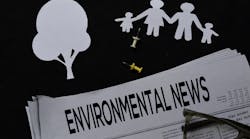Welcome to a new year!
I hope you were able to spend the past few weeks enjoying good food, the company of friends and family and savoring the season of whatever holidays you observe.
I have already taken down my decorations, and it feels bare and empty. I suppose it’s a nice reset, but I cynically see it as the time of year for self-proclaimed experts to tell me to improve all aspects of my life by decluttering as companies are eager to sell me containers to sell me stuff (containers) to help organize my stuff.
There’s something to be said for a new notebook and a clean work surface, but it seems the clutter—whether physical, digital, emotional or psychological—is never really gone. I’ve started to embrace the mess as signs of life and progress. Perhaps nowhere is this more true than when it comes to conversations about the environment, climate change and ESG.
We’re juggling all sorts of short-term, medium-term and long-term problems and solutions. There’s no easy way around it, just through it. So, while it may not be helpful exactly, I hope it is some comfort that we’re all muddling our way through.
Until next time, take care, be kind and stay safe.
California’s Flooding Forces a Reckoning
The news has been filled with footage of the rain and subsequent flooding are causing in California. It makes me count my blessings that my own weather has been relatively mild, especially for January.
It’s tempting to think that what happens far away from us is of no concern, but we’re all affected by the flooding. For example, California is a major food exporter, so don’t be surprised if you have difficulty finding certain ingredients at the grocery store in the near future, or if what you do find is more expensive.
It’s with this same sense of interconnectedness that we must approach climate change and climate disasters. I expect to see more think pieces on California’s geography, weather and the recent droughts. But this analysis from The New York Times helped me understand why we got here, and where we go next.
Historically, the state has developed levees and dams that interfered with the ecosystem and diverted water from one region to another. Then houses and other buildings sprung up. However, that is causing more problems and exacerbated existing ones. We have seen this same pattern with the recent wildfires in California and hurricanes in Florida.
I’m not an expert, but it seems we’re facing a reckoning because we can’t continue doing what we have been doing. We’re going to need to make fundamental changes.
This sums it up best: “The biggest obstacle to making room for rivers might be changing how the state views its relationship with the natural world, said Dr. Joshua Viers of the University of California.”
Read the full article here.
Eat Your Food!
This article had me hooked right from the start:
“Jennifer Savage was scrambling to pull something together for dinner. Deep in the back of her fridge, she found a container of stuffed peppers. Very old stuffed peppers. She groaned, then did what millions of Americans do every day, without a second thought: She scraped the rotten food into the garbage.
“Sitting nearby, her daughter, Riley, burst into tears.”
Finding spoiled food in the fridge, freezer or pantry is a common occurrence. An estimated one-third of the food in the U.S. goes unsold or uneaten. But it doesn’t have to be that way. And it does have an impact on the environment.
In the U.S., household food waste accounts for twice as many greenhouse gas emissions than commercial aviation. In fact, some experts suggest that reducing food waste—and diverting it from landfills—is one of the most important actions we can take to combat climate change.
That’s what the Solid Waste Authority of Central Ohio (SWACO) is trying to teach residents of Upper Arlington. The organization sent out surveys, conducted a trash audit and analyzed their findings. Then they developed messages and even offered incentives that would lead to behavior change. It’s a time-consuming process, but it is worth the effort. SWACO found that food waste volume had declined by 21%.
So, the next time you’re about to toss those ripe bananas, consider what else you could do instead, perhaps make banana bread. And, if you realize this is more of a habit, consider how to avoid this situation in the future, perhaps through weekly meal plans and grocery shopping with a list. You’ll save money and, more importantly, be a good role model for today’s children, who will be living with the consequences of our actions.
Read the full article here.
Climate Change by the Numbers
The annual turning over the calendar gives a psychological boost of a clean start, but the problems of the past year (and years before that) continue to plague us. Still, without the ability to take a step back, it can be difficult to gain perspective to see where gains have been made or lost.
Some scientists say we may cross the threshold of the Paris Agreement’s climate warming limit of 1.5 Celsius within a decade. Worse, greenhouse gas emissions have recovered from the COVID-19 pandemic, even surpassing their 2019 levels.
But, at least 18 countries have seen emissions decline for more than a decade. And Bloomberg expects we will see double-digit growth in carbon-free energy this year.
We also saw more discussions at the world’s stage on climate change and landmark legislation pass to help protect the planet and people.
It’s messy and often feels like we’re taking one step forward and two steps back. But, for what it’s worth, we’re continuing (or starting) the hard work. And that is something to pause and celebrate.
Read the full article here.
